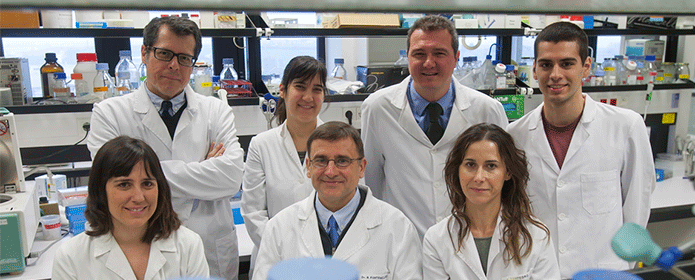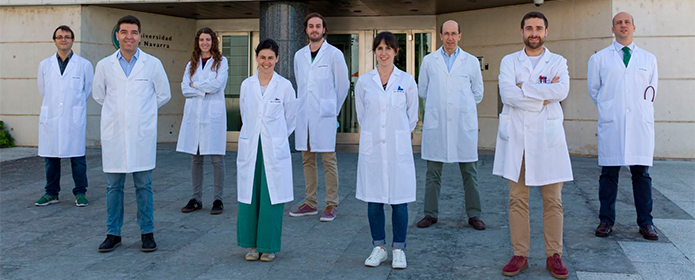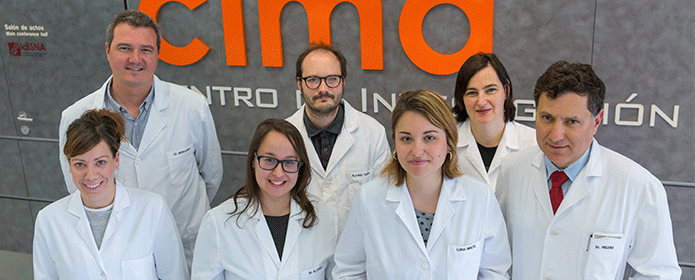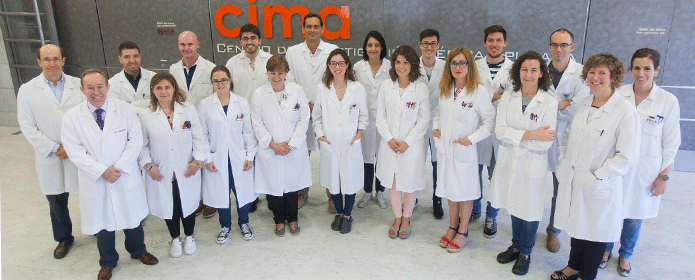CIMA and Moderna Therapeutics develop a new technology for the treatment of acute intermittent porphyria
It acts on the origin of this metabolic genetic disorder which produces painful intermittent crises. At present there is no effective treatment

Researchers at the Center for Applied Medical Research (CIMA) of the University of Navarra have developed a new messenger RNA (mRNA) technology which acts on the origin of the disorder and rapidly corrects the symptoms of acute intermittent porphyria in preclinical models. The results, published yesterday in the scientific journal Nature Medicine, are the result of collaboration with the biotechnology company Moderna Therapeutics (Cambridge, Massachusetts. USA).
Acute intermittent porphyria is a rare, or orphan, genetic disease, caused by the inability of the liver to metabolize porphyrin precursors. It presents with painful intermittent prices and may cause major neurological damage; a liver transplant may even be necessary. Crisis in patients may be caused by some drugs, strict dieting or prolonged stress. However, the main triggers are female hormones associated with the menstrual cycle, and so the disorder occurs particularly in young women with weighty work and family responsibilities.
“At the present time, some drugs can control the symptoms, but there is no specific treatment to deal with the origin of the disease", said Dr. Antonio Fontanellas, lead author of the article. According to Dr. Fontanellas, a porphyria researcher into porphyria for the CIMA Hepatology Program and a member of the Online Center for Biomedical Research into Hepatic and Digestive Diseases (CIBERehd), "our research provides proof of the effectiveness of RNAs in the treatment of acute intermittent porphyria”.
The mRNA is the molecule which connects the information accumulated in the genes with the production of the proteins necessary for the proper functioning of the cell. “Our work suggests that the administration of this mRNA encapsulated in patented lipid nanoparticles (microdrops of fat) can, in less than two hours, restore the activity of the deficitary enzymes in the livers of mice with porphyria. We have also seen that it protects against key characteristics of the disease, such as pain hypertension and motor disability. Another advantage of this technology is the possibility of repeating the administration as frequently as necessary in order to avoid new crises”, stated Dr. Fontanellas.
“In this joint work we show that the mRNA technology restores the enzyme deficiency in the hepatic cells and normalizes the markers for the disease during the attacks", elucidated Dr. Paolo Martini, Chief Scientific Officer of Moderna Therapeutics Rare Disease Program. "These data give even more support to our current efforts in the area of rare metabolic diseases, in which the mRNA may allow a particular tissue to produce therapeutic levels of a functional protein".
Moderna Therapeutics is a pioneer in the discovery and development of mRNA therapies and vaccines, a completely new type of drug which supplies information to the cells in order to produce intracellular or secreted proteins which may be of therapeutic or preventative benefit both for patients and healthy individuals. With their innovative platform, Moderna Therapeutics is creating mRNA drugs for a broad range of diseases and disorders, in many cases addressing objectives which are unattainable with the current technology or areas of medical need for which appropriate products are not available. Moderna is developing its mRNA drugs for infectious, rare, cardiovascular and immuno-oncology diseases through exclusive programs and collaborations strategic partners.
The Hepatology Program at CIMA of the University of Navarra is a research group with a broad track record on basic and translational hepatology at a worldwide level. This experience has grown over several decades at the Department of Internal Medicine at the Clínica Universidad de Navarra, and more recently, at CIMA. “In the program we dedicate our efforts to identifying therapeutic targets and developing strategies for the prevention and treatment of metabolic liver diseases such as fatty liver and porphyria, cirrhosis and liver tumors”, stated Dr. Matías Ávila, director of the program.




